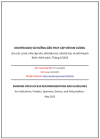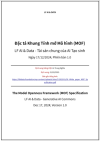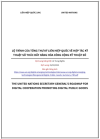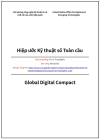WindowsXP falls under 60%, IE8 loses share for the first time
ByEmilProtalinski | Last up-dated November 2, 2010
Bàiđược đưa lên Internet ngày: 02/11/2010
Lờingười dịch: Những con số thống kê của các tổ chứckhác nhau là khác nhau xa về thị phần các trình duyệtweb: (1) Theo NetApplications thì IE số 1, Firefox số 2, Chromesố 3, Safari số 4; (2) Theo Ars Technica thì Firefox số 1,Chrome số 2, Safari số 3, IE số 4. Tin vào cái gì là tùy ởbạn.
Thángtrước từng là một sự pha trộng các tin tốt và xấuđối với Microsoft. Tốt ư? Cuối cùng thì Windows XP đãrơi xuống dưới mức 60%. Xấu ư? Internet Explorer tiếptục có thị phần đi xuống khi mà IE8 đánh mất thịphần lần đầu tiên và IE9 beta không thu hút được sựchú ý của công chúng. Trong khi đó thì Firefox trượt dàikhỏi thị phần 25%, trong khi Chrome và Safari tiếp tục sựtăng trưởng của chúng. Trước khi chúng ta đi vào chitiết về mảng trình duyệt, hãy kiểm tra ông bạn giàcủa chúng ta, Windows XP.
Lastmonth was a mix of good news and bad news for Microsoft. The good?Windows XP finally fell below the 60 percent mark. The bad? InternetExplorer continues to explore new market share lows as IE8 lostmarket share for the first time and the IE9 beta failed to capturethe attention of the browsing public. Meanwhile Firefox slips a tadfarther away f-rom the 25 percent market share mark, while Chrome andSafari continue their growth. Before we go into detail on the browserfront, let's check in on our old friend, Windows XP.

Nguồndữ liệu: NetApplication; Datasource: NetApplications
Giờnày năm ngoái, gần 70% việc duyệt web tới từ Windows XP.Kể từ đó, XP đã rơi khoảng 10% xuống còn 59.07% thịphần. Trong một số giai đoạn, Windows Vista mất gần như6% xuống còn 12.88%, với một sự xuống nhanh hơn trong 3tháng qua. Windows 7 trong khi đó đã giành được hơn 14%,đẩy nó lên 18.24%. Theo Ars, các độc giả của chúng tôiđã ôm lấy hệ điều hành mới nhất của Microsoft nhanhhơn nhiều. 24.73% các độc giả của Ars sử dụng WindowsXP, 7.89% dùng Vista, và 28.18% dùng Windows 7.
Thistime last year, close to 70 percent of web browsing happened onWindows XP. Since then, XP has fallen almost 10 percentage points to59.07 percent market share. In the same period, Windows Vista lostalmost six percentage points to 12.88 percent, with an acceleratingdecline over the last three months). Windows 7 meanwhile has gainedover 14 percentage points, pushing it to 18.24 percent. At Ars, ourreaders have embraced Microsoft's latest operating system muchfaster. 24.73 percent of Ars readers use Windows XP, 7.89 percent areon Vista, and 28.18 percent have Windows 7.

Nguồndữ liệu: NetApplications; Datasource: NetApplications
Bâygiờ tới các trình duyệt: Giữa tháng 9 và 10, InternetExplorer đã xuống 0.39%. Trong khi đó, Firefox xuống 0.14%.Chrome đã giành được 0.49%, là người thắng lớn nhấttrong tháng này. Safari lên 0.06% và Opera xuống 0.11%.
Với59.26%, Internet Explorer lại đạt tới một điểm thấpmới. Sự đi xuống này tới bất chấp có IE9 và lần đầutiên, sự trợ giúp tới từ IE8. Mặc dù Microsoft đã nóivới Ars rằng hơn 900 đối tác đã xây dựng Jump Lists chocác site của họ (một tính năng của IE9), thì bản betakhông được sử dụng rộng rãi như họ mong đợi. IE9tháng trước tăng 0.28% (0.32% nếu bạn tính tới chế độtương thích). IE8, trong khi đó, lần đầu tiên rơi xuống29.01% (32.04% với chế độ tương thích), nhưng nó vẫn làtrình duyệt phổ biến nhất thế giới.
Khôngmay cho những lập trình viên Web ở khắp nơi, IE6 (15.1%)tiếp tục phổ biến hơn IE7 (9.92%), dù tháng này thịphần của nó giảm nhiều hơn. Tin tốt là IE7 đã xuốngdưới 10%, và IE6 xuống dưới 15% vào tháng sau.
Nowthe browsers: Between Septemberand October, Internet Explorer d-ropped a modest 0.39 percent.Firefox, meanwhile, fell 0.14 percent. Chrome gained 0.49 percent,making it the biggest winner this month. Safari was up 0.06 percentand Opera dipped 0.11 percent.
At59.26 percent, Internet Explorer has hit a new low point. This d-ropcomes despite publicIE9 builds and for the first time, help f-rom IE8. AlthoughMicrosoft told Ars that over 900 partners have built Jump Lists fortheir sites (an IE9-only feature), the beta isn't being used aswidely as it could be. IE9 last month grew to 0.28 percent (0.32percent if you count compatibility mode). IE8, meanwhile, for thefirst time fell to 29.01 percent (32.04 with compatibility mode), butit's still the world's most popular browser.
Unfortunatelyfor Web developers everywhe-re, IE6 (15.01 percent) continues to bemore popular than IE7 (9.92 percent), though this month its sharedeclined more. The good news is that IE7 has d-ropped below the10 percent mark, and IE6 should d-rop below 15 percent next month.

Nguồndữ liệu: NetApplications; Datasource: Net Applications
Bứctranh ở trên về 13 tháng trước minh họa xu thế chung kháthú vị. Firefox vẫn giữ còn xa so với 25%, mất thị phầnnhiều hơn so với nó đã giành được vào năm ngoái. IEtiếp tục sự đi xuống của nó, trong khi đó Chrome cóhơn gấp đôi thị phần của nó. Safari đã giành đượcmột chút hơn 1%, trong khi Opera (không được thể hiện)về cơ bản vẫn đứng yên.
Thesnapshot above of the past 13 months illustrates the general trendquite nicely. Firefox remains far away f-rom what may bethe unreachable25 percent mark, having lost more share than it gained in thelast year. IE continues its slide, while Chrome has more than doubledits share. Safari's gains are just short of 1 percentage point, whileOpera (not shown) is essentially static.

Nguồndữ liệu: Ars Technica; Datasource: Ars Technica
Nhưmọi khi, những thứ ở Ars là rất khác. Đã không có sựthay đổi chỗ lần này: Firefox tiếp tục áp đảo, Chromeđứng vững ở vị trí thứ 2, Safari thứ 3, IE thứ 4, vàsau đó là Opera. Tháng trước, Firefox đã mất thị phần,và cả IE nữa. Chrome và Safari thì được, trong khi Operađã không nổi lên được.
Asalways, things at Ars are very different. There was no place-changingthis time: Firefox continues to dominate, Chrome is a solid second,Safari is third, IE is fourth, and Opera brings up the rear. Lastmonth, Firefox lost share, as did IE. Chrome and Safari gained, whileOpera didn't budge.
Dịchtài liệu: Lê Trung Nghĩa
Ý kiến bạn đọc
Những tin mới hơn
Những tin cũ hơn
Blog này được chuyển đổi từ http://blog.yahoo.com/letrungnghia trên Yahoo Blog sang sử dụng NukeViet sau khi Yahoo Blog đóng cửa tại Việt Nam ngày 17/01/2013.Kể từ ngày 07/02/2013, thông tin trên Blog được cập nhật tiếp tục trở lại với sự hỗ trợ kỹ thuật và đặt chỗ hosting của nhóm phát triển...
 DigComp 3.0: Khung năng lực số châu Âu
DigComp 3.0: Khung năng lực số châu Âu
 Các bài toàn văn trong năm 2025
Các bài toàn văn trong năm 2025
 Các bài trình chiếu trong năm 2025
Các bài trình chiếu trong năm 2025
 Các lớp tập huấn thực hành ‘Khai thác tài nguyên giáo dục mở’ tới hết năm 2025
Các lớp tập huấn thực hành ‘Khai thác tài nguyên giáo dục mở’ tới hết năm 2025
 Tập huấn thực hành ‘Khai thác tài nguyên giáo dục mở’ cho giáo viên phổ thông, bao gồm cả giáo viên tiểu học và mầm non tới hết năm 2025
Tập huấn thực hành ‘Khai thác tài nguyên giáo dục mở’ cho giáo viên phổ thông, bao gồm cả giáo viên tiểu học và mầm non tới hết năm 2025
 Các tài liệu dịch sang tiếng Việt tới hết năm 2025
Các tài liệu dịch sang tiếng Việt tới hết năm 2025
 Loạt bài về AI và AI Nguồn Mở: Công cụ AI; Dự án AI Nguồn Mở; LLM Nguồn Mở; Kỹ thuật lời nhắc;
Loạt bài về AI và AI Nguồn Mở: Công cụ AI; Dự án AI Nguồn Mở; LLM Nguồn Mở; Kỹ thuật lời nhắc;
 Tổng hợp các bài của Nhóm các Nhà cấp vốn Nghiên cứu Mở (ORFG) đã được dịch sang tiếng Việt
Tổng hợp các bài của Nhóm các Nhà cấp vốn Nghiên cứu Mở (ORFG) đã được dịch sang tiếng Việt
 Tổng hợp các bài của Liên minh S (cOAlition S) đã được dịch sang tiếng Việt
Tổng hợp các bài của Liên minh S (cOAlition S) đã được dịch sang tiếng Việt
 Năm Khoa học Mở & Chuyển đổi sang Khoa học Mở - Tổng hợp các bài liên quan
Năm Khoa học Mở & Chuyển đổi sang Khoa học Mở - Tổng hợp các bài liên quan
 Bàn về 'Lợi thế của doanh nghiệp Việt là dữ liệu Việt, bài toán Việt' - bài phát biểu của Bộ trưởng Nguyễn Mạnh Hùng ngày 21/08/2025
Bàn về 'Lợi thế của doanh nghiệp Việt là dữ liệu Việt, bài toán Việt' - bài phát biểu của Bộ trưởng Nguyễn Mạnh Hùng ngày 21/08/2025
 Bạn cần biết những gì về các khung năng lực AI mới của UNESCO cho học sinh và giáo viên
Bạn cần biết những gì về các khung năng lực AI mới của UNESCO cho học sinh và giáo viên
 ‘KHUYẾN NGHỊ VÀ HƯỚNG DẪN TRUY CẬP MỞ KIM CƯƠNG cho các cơ sở, nhà cấp vốn, nhà bảo trợ, nhà tài trợ, và nhà hoạch định chính sách’ - bản dịch sang tiếng Việt
‘KHUYẾN NGHỊ VÀ HƯỚNG DẪN TRUY CẬP MỞ KIM CƯƠNG cho các cơ sở, nhà cấp vốn, nhà bảo trợ, nhà tài trợ, và nhà hoạch định chính sách’ - bản dịch sang tiếng Việt
 50 công cụ AI tốt nhất cho năm 2025 (Đã thử và kiểm nghiệm)
50 công cụ AI tốt nhất cho năm 2025 (Đã thử và kiểm nghiệm)
 ‘Đặc tả Khung Tính mở Mô hình (MOF)’ của LF AI & Data - Tài sản chung của AI Tạo sinh - bản dịch sang tiếng Việt
‘Đặc tả Khung Tính mở Mô hình (MOF)’ của LF AI & Data - Tài sản chung của AI Tạo sinh - bản dịch sang tiếng Việt
 ‘LỘ TRÌNH CỦA TỔNG THƯ KÝ LIÊN HIỆP QUỐC VỀ HỢP TÁC KỸ THUẬT SỐ THÚC ĐẨY HÀNG HÓA CÔNG CỘNG KỸ THUẬT SỐ’ - bản dịch sang tiếng Việt
‘LỘ TRÌNH CỦA TỔNG THƯ KÝ LIÊN HIỆP QUỐC VỀ HỢP TÁC KỸ THUẬT SỐ THÚC ĐẨY HÀNG HÓA CÔNG CỘNG KỸ THUẬT SỐ’ - bản dịch sang tiếng Việt
 AI trong TVET - Một vài gợi ý triển khai trong thực tế
AI trong TVET - Một vài gợi ý triển khai trong thực tế
 Tài sản chung kỹ thuật số và Hàng hóa Công cộng Kỹ thuật số - Tìm thấy nền tảng chung cho các nhà hoạch định chính sách
Tài sản chung kỹ thuật số và Hàng hóa Công cộng Kỹ thuật số - Tìm thấy nền tảng chung cho các nhà hoạch định chính sách
 Tọa đàm ‘Vai trò của Tài nguyên Giáo dục Mở trong chuyển đổi số giáo dục đại học’ tại Viện Chuyển đổi số và Học liệu - Đại học Huế, ngày 12/09/2025
Tọa đàm ‘Vai trò của Tài nguyên Giáo dục Mở trong chuyển đổi số giáo dục đại học’ tại Viện Chuyển đổi số và Học liệu - Đại học Huế, ngày 12/09/2025
 ‘Hiệp ước Kỹ thuật số Toàn cầu’ của Liên hiệp quốc - bản dịch sang tiếng Việt
‘Hiệp ước Kỹ thuật số Toàn cầu’ của Liên hiệp quốc - bản dịch sang tiếng Việt
 12 dự án AI Nguồn Mở hàng đầu để bổ sung vào kho công nghệ của bạn. 11. Hugging Face Transformers
12 dự án AI Nguồn Mở hàng đầu để bổ sung vào kho công nghệ của bạn. 11. Hugging Face Transformers
 Dự án DIAMAS đưa ra Khuyến nghị và Hướng dẫn Truy cập Mở Kim cương
Dự án DIAMAS đưa ra Khuyến nghị và Hướng dẫn Truy cập Mở Kim cương
 50 công cụ AI tốt nhất cho năm 2025 (Đã thử và kiểm nghiệm) - Trợ lý AI tốt nhất (chatbots)
50 công cụ AI tốt nhất cho năm 2025 (Đã thử và kiểm nghiệm) - Trợ lý AI tốt nhất (chatbots)
 Hướng dẫn kỹ thuật lời nhắc. Kỹ thuật viết lời nhắc. Lời nhắc Tái Hành động (ReAct)
Hướng dẫn kỹ thuật lời nhắc. Kỹ thuật viết lời nhắc. Lời nhắc Tái Hành động (ReAct)
 ‘Quản trị dữ liệu trong AI Nguồn Mở. Xúc tác cho quyền truy cập có trách nhiệm và có hệ thống’ - bản dịch sang tiếng Việt
‘Quản trị dữ liệu trong AI Nguồn Mở. Xúc tác cho quyền truy cập có trách nhiệm và có hệ thống’ - bản dịch sang tiếng Việt
 50 công cụ AI tốt nhất cho năm 2025 (Đã thử và kiểm nghiệm) - Trình tạo nhạc AI tốt nhất
50 công cụ AI tốt nhất cho năm 2025 (Đã thử và kiểm nghiệm) - Trình tạo nhạc AI tốt nhất
 Vì sao Singapore đang xây dựng hàng hóa công cộng kỹ thuật số
Vì sao Singapore đang xây dựng hàng hóa công cộng kỹ thuật số
 Nâng cao tính mở và khả năng sử dụng của Hàng hóa Công cộng Kỹ thuật số bằng cách chỉ chấp nhận các bộ sưu tập nội dung và bộ dữ liệu hoàn toàn được cấp phép mở
Nâng cao tính mở và khả năng sử dụng của Hàng hóa Công cộng Kỹ thuật số bằng cách chỉ chấp nhận các bộ sưu tập nội dung và bộ dữ liệu hoàn toàn được cấp phép mở
 Hình dung lại dữ liệu cho AI Nguồn Mở: Lời kêu gọi hành động
Hình dung lại dữ liệu cho AI Nguồn Mở: Lời kêu gọi hành động
 Chiến lược 2023-2028 của DPGA
Chiến lược 2023-2028 của DPGA